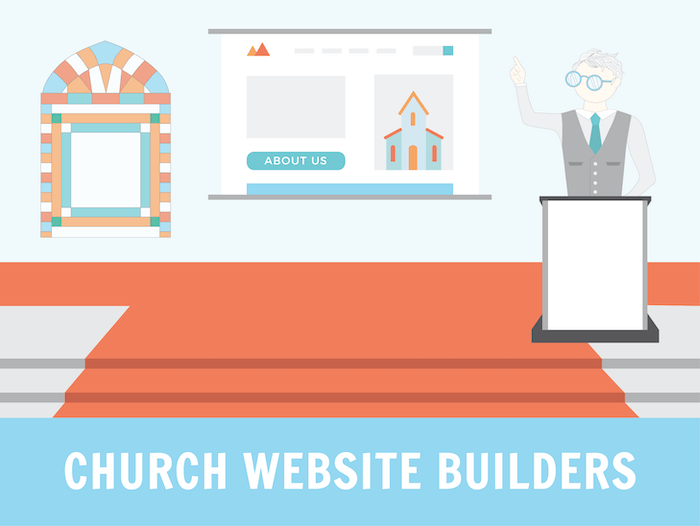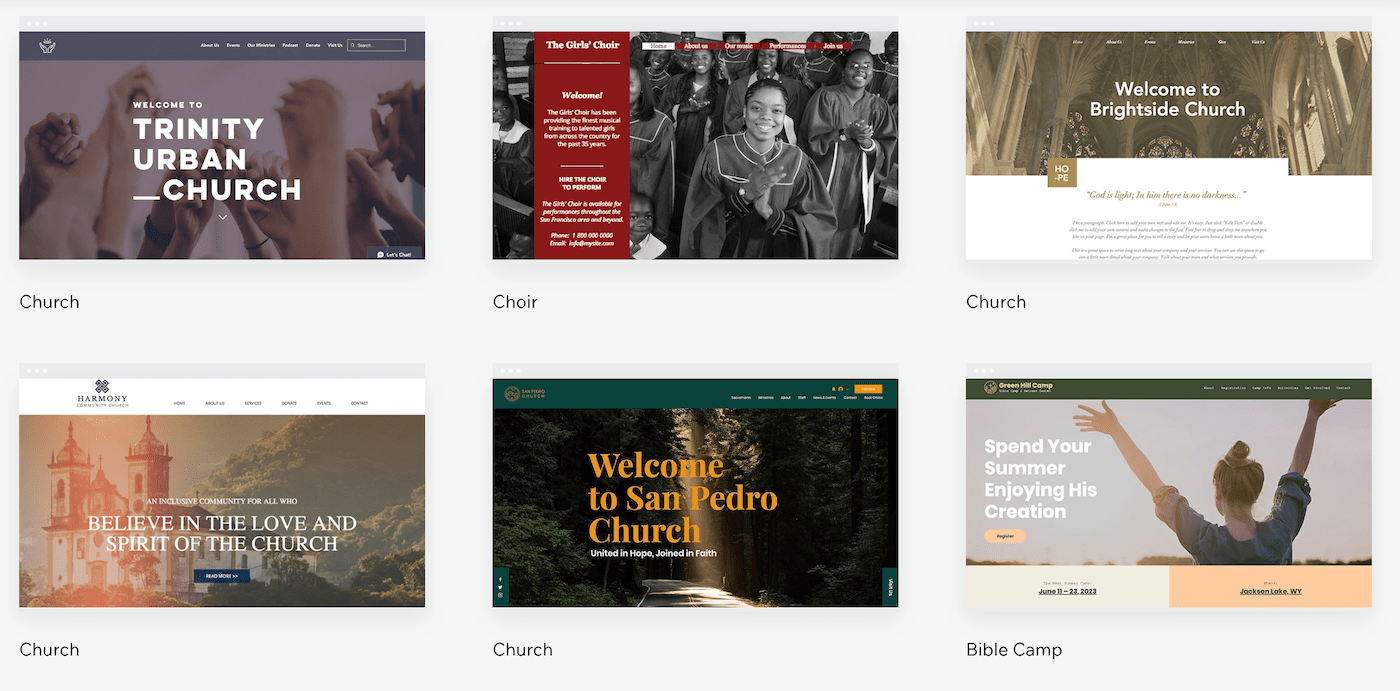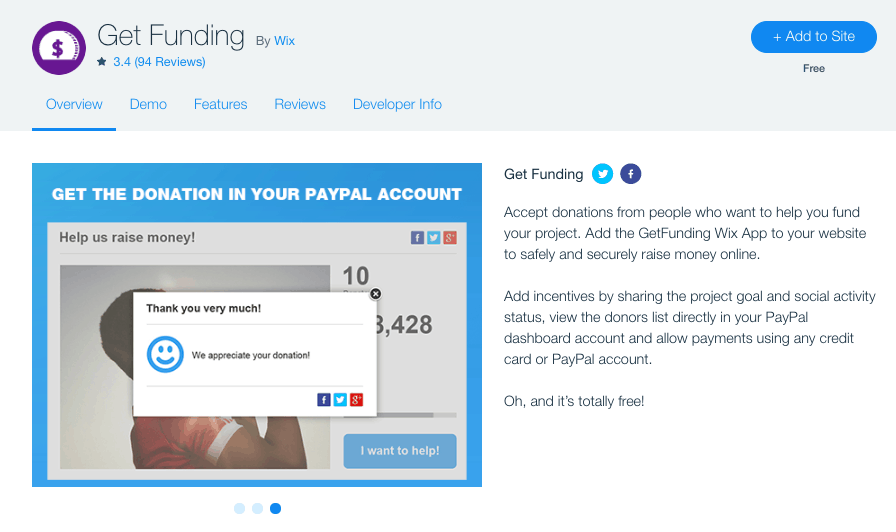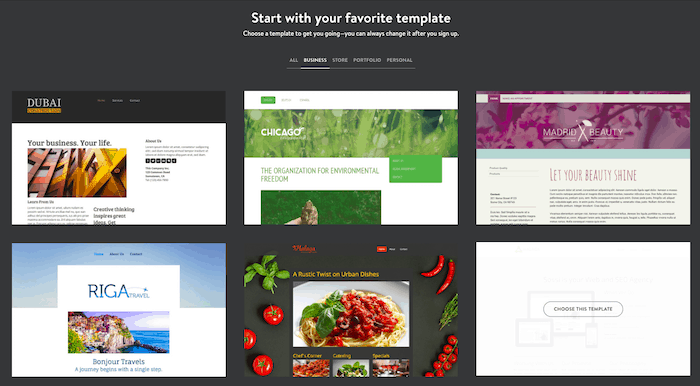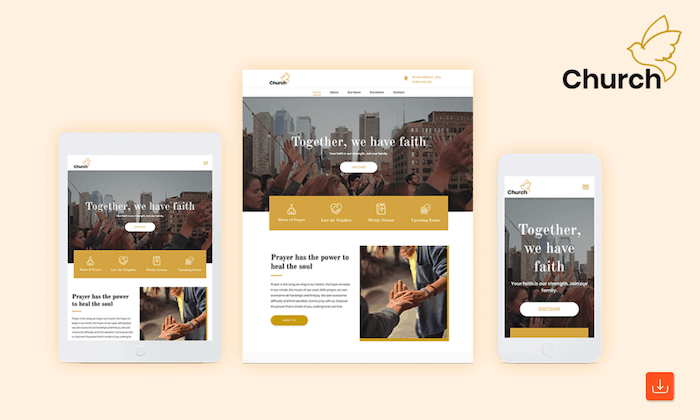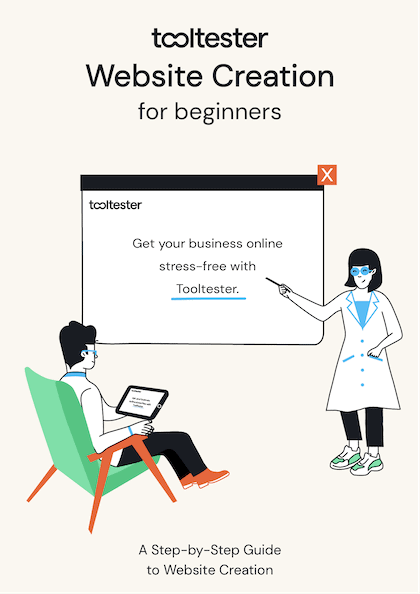Tooltester is supported by readers like yourself. We may earn an affiliate commission when you purchase through our links, which enables us to offer our research for free.
So you’re ready to create an online home for your church. Great! Now the question is: what are the best church website builder?
Do you want to start with a premade church template? Or do you want the freedom to build it however you like?
There’s a lot to think about. Luckily, we’ve compiled this list of the best online tools to help you get started. But first, let’s see what you might need…
Summary: What is The Best Church Website Builder?
Wix comes with 15 church-specific themes you can customize. Their websites have robust features and can be upgraded with extra apps. The Light plan costs $17 a month. Nucleus is designed specifically for church websites. It costs $79 a month. Weebly is the easiest to use but has only 1 church theme. The Pro plan costs $12 monthly.
What to Look For in the Best Church Website Builders
Any decent website made with a builder will let you display basic information such as location, contact details, and maps. Social media integration is pretty standard, so is the ability to add images, videos and content via blog posts. You should also have no problem offering downloadable resources for your online visitors.
But a church website might also need specific features:
- Does it accept donations? Unlike for profit businesses, you might need people to pitch in through your website. It can be more complicated than you think, because most online stores aren’t set up for donations. Speaking of which…
- Can you add an online store? With most website builders, the answer is yes. But it can be costly if you have a lot of items available.
- Can you set up and manage events? Churches often organize community events. Ideally, the website will let people preview them at a glance through a calendar, and maybe even RSVP so you get an idea of attendance.
- Is it easy to use? Look for drag and drop website builders that are not only easy to use but also provide lots of flexibility. An added bonus is AI-support that helps you set up your site initially.
- Is there a members-only area? You might want to lock certain pages so only people from the administration or appointed volunteers can access them.
- Can you add or integrate a newsletter? Some website builders have their own newsletter service. Others can let you add a newsletter registration form by adding a line of code into your website, to let you capture new subscribers for your church’s email marketing campaigns.
What Do I Need to Get Started With Website Builders?
Same as when building any other website:
- Create an account with the website builder (email address and password)
- You usually start by choosing a template
- Add pages and sections
- Customize the content such as text and images
- Optional: edit SEO settings
And now, without further ado, let’s see which church website builders meet all (or almost all) the requirements.
Wix – The Nicest Church Templates to Get Started
Wix’s church templates are found in the religion and non-profit section of their library, and what a great selection that is. The templates look modern, and there are 15 of them, so quite a lot to choose from. And they are all mobile-friendly, so you can adapt them to look good on computers and phone screens.
This site builder also regularly tops the list of our favorite website builders in general, so you can read more about their features in our full Wix review or watch the video below:
What’s great for churches? All the features mentioned in the intro are there. So you get the bookings page, membership areas, event and team management so multiple people can upload info to the site, amongst others.
In terms of security, we love the backup site feature, which means you’re always covered if you accidentally mess up the design or want to restore it to a previous state. And speaking of template design, Wix gives you a lot of customization freedom.
Wix is also known for its fantastic app market, where you can install tons of free extensions. There is even one that works specifically for accepting donations. This means that if a feature isn’t available out of the box, you’re sure to find it in their 250+ free and paid extra apps.
The Get Funding app for accepting donations on Wix sites
Where they could improve: Wix is on the pricier end of the spectrum. We also find that if you store a lot of long videos on the site, such as long recorded sermons or masses, you might eventually run out of storage or video minutes. However, you can easily upload to YouTube and embed your video on your site without any problems or using up any Wix storage. Of course, picking a higher Wix plan is another option.
Complex websites for big churches or religious organization websites could also require more sub-navigation levels, because Wix only has one.
Finally, one downside is that once you’ve chosen your template, you can’t ever change your mind. You’ll be able to edit and customize it, but not start with a completely new one (unless you start from scratch).
How much does Wix cost? You’re looking at $17 per month for the Light plan. It’s ad-free and includes a free custom domain name for 1 year. Our full guide to Wix prices is here.
> Free trial at www.wix.com
Nucleus – The Church Website Experts
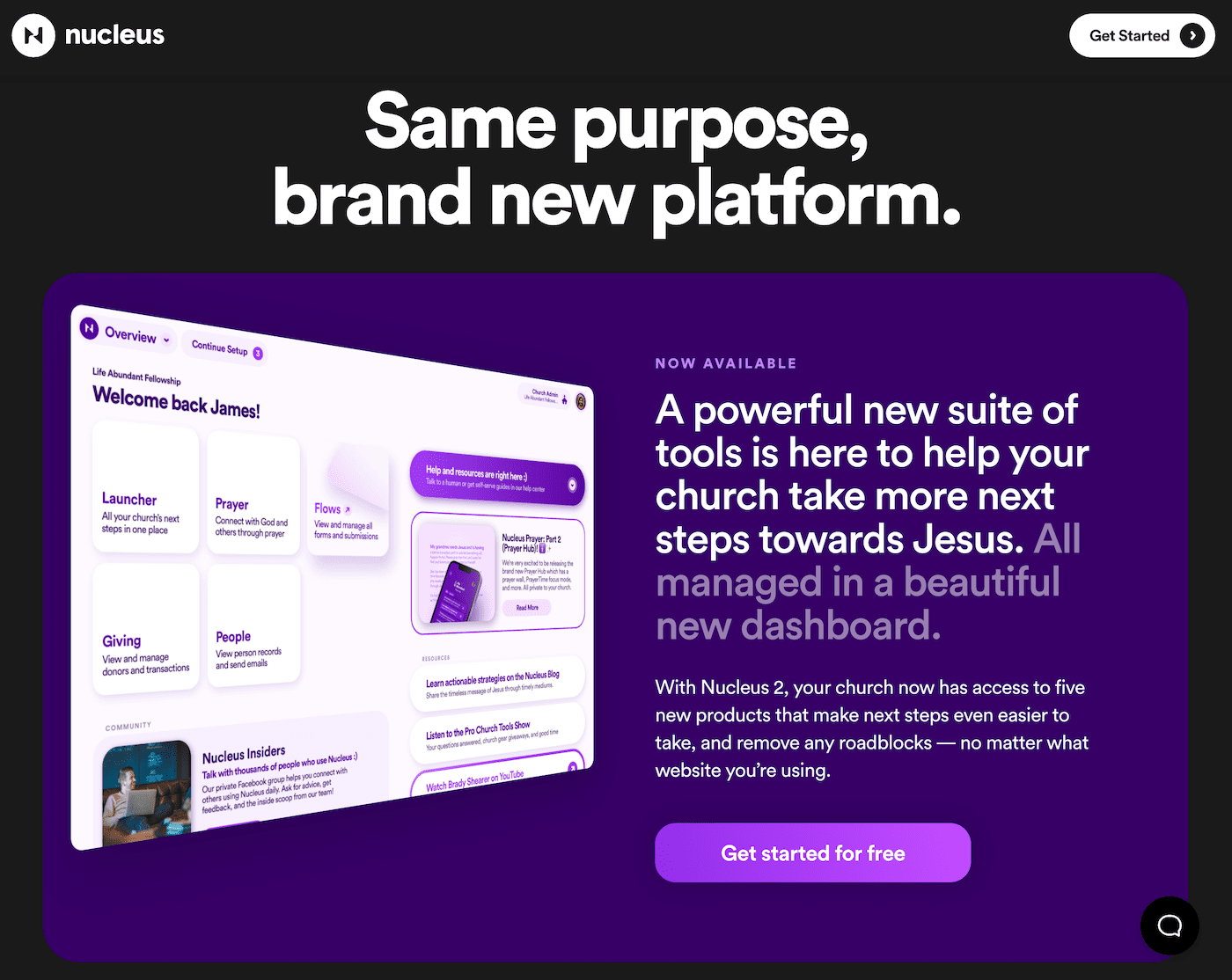
Nucleus (with its latest version 2) is a solution that is specifically designed for churches. It has all the features you could expect, including a robust form manager, clear sections for contact, blogs, calendars and section for donations. You can even add a prayer request page and sermon page where people can listen to the latest recordings.
So why isn’t Nucleus at the top of this list of the best website builders for churches? There are a few caveats, as you’ll find below.
What’s great for churches? All the features you could dream of are there, in an easy to use interface. It’s been clearly engineered to become the all-in-one-hub for your church. You can gather all your communications in one place and make things as easy as possible for your congregation.
The builder itself is extremely simple (basic even) which means you need zero tech expertise to get started.
Where they could improve: The biggest drawback is the price. Sure, you get church-specific features, but it’s easy enough to enable similar ones with Weebly or Wix if you take the time to look for them. And even with paid add-ons, there’s no way you’ll end up paying $99 a month, the lowest price available for the Nucleus Web plan.
Then there’s the matter of the design flexibility. Nucleus is super easy to use, but that means sacrificing options. In fact, all the designs look pretty similar. Here are some examples:
legacyfamily.info, lifeabundant.info, cclongview.com
How much does Nucleus cost? If you pay yearly, $99 a month for the Web tier. It includes the website builder, a form builder, a sermon manager and podcast hosting. The Giving plan starts at $290 for smaller churches (up to 50 members) and removes the processing fees for donations.
On top of all that, you can add the Media package for $39 a month.
> Free 30-day trial at Nucleus.church
Squarespace – The Most Stylish
If you want a clean, modern, minimalist church website, Squarespace is a great option. Their templates are some of the best looking around, whether you look at them on computers or mobile devices.
It’s worth noting that Squarespace began as a place for blogs, so that’s really their strength. Although the online store feature is surprisingly powerful, selling items online will make your plan pricier than with other competitors.
What’s great for churches? If regular updates are a big part of your church, Squarespace’s blogging feature is fantastic. The online store is easy enough to add and manage and it’s super-powerful. Squarespace also offers podcast hosting. They’ve also got a solid membership module for your community.
Where they could improve: No church templates – you’ll have to design yours based on what’s available in the Community and Non Profits section. There are only two base templates, which you can then modify to suit your needs, but it’s not super intuitive.
Squarespace is also pricier than other providers, and the 1 sub-navigation level could be limiting for big church websites.
How much does Squarespace cost? The Personal plan is $16 per month, but you’ll need the Online Store Basic plan at $39 to sell items or accept donations. Our full Squarespace pricing review is here.
> Free trial at www.squarespace.com
Webnode – Best for Multilingual Churches
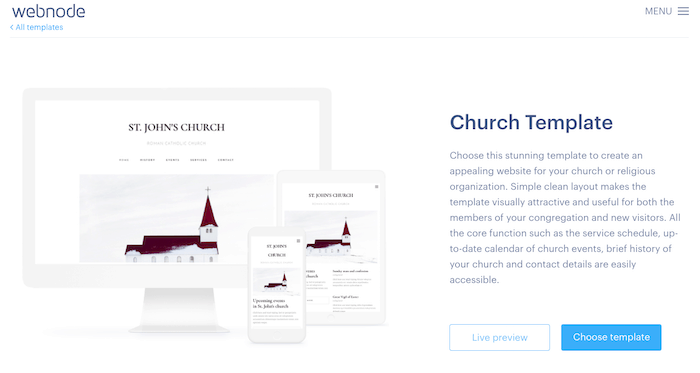
If you want to reach churchgoers in multiple languages, your options are pretty limited. Sure, you could create duplicates of each website page, but it’s much easier to use a system that works out of the box. This is exactly what Webnode does, but at a cost, as you’ll see below.
What’s great for churches? There is one church template, and a few others for nonprofits. However, there isn’t a specific category for them, so you’ll need to browse their entire template library. If your churches budget isn’t huge, you can either use the free plan or the very cost-effective MINI plan at ($12.90 a month). It’ll show a small Webnode ad but will let you use a custom domain name.
Where they could improve: No likes and shares widget for social media platforms. The blog feature isn’t the best around, and you can’t add extra features because there isn’t a Webnode app store.
How much does Webnode cost? To remove ads, you’ll need the Standard plan, which begins at $12.90. Here is the full Webnode pricing review.
> Free trial at www.webnode.com
Tithe.ly – The All-In-One Church Site Builder
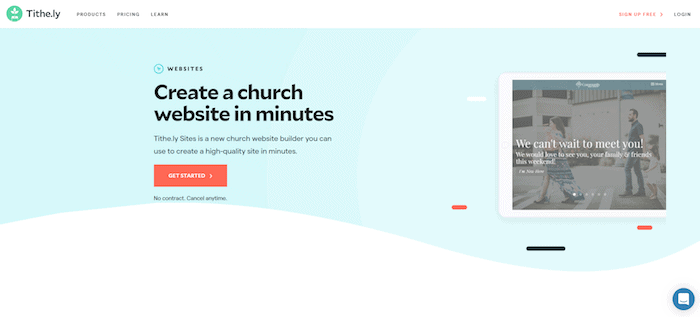
Tithe.ly is a platform fully focused on helping churches support their community by going digital. Currently, around 25,000 churches are using it in more than 50 countries, and over 8 currencies can be used with the Tithe.ly platform (of course US dollars is one of them).
What’s great for churches? Tithe.ly is a solution that has been specifically designed to build websites for churches. But it’s not only a website builder, amongst other things, it’ll allow you to create an app for your church (there’s a separate plan for this), receive donations and manage and organize events. Their templates are responsive and beautiful.
Where they could improve: Creating an account with them will take some time as you need to input your bank details and upload an ID, which is not ideal if you’d like to create a site for your church quickly. Creating a website is not part of the free plan.
How much does Tithe.ly Sites cost? To add a website to your Tithe.ly account you’ll need to pay $19 a month plus a $149 (one time) setup fee. It’s not the cheapest option.
Weebly – The Easiest to Use
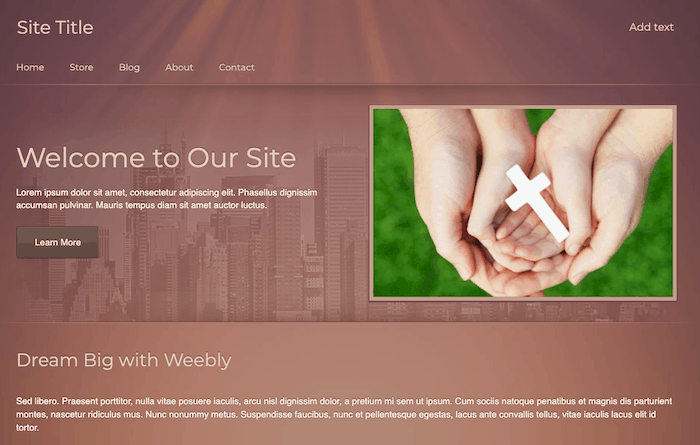
As we noted in our full review of Weebly, this website builder is probably one of the easiest to use. This is great news if you’re not too tech-savvy, and if you want something functional, fast, with excellent results. Check out how it works in the video below:
What’s great for churches? The ease of use is probably the biggest draw. It’s worth noting that you don’t get as much freedom in designing your template as with Wix. But for some users, it’s actually a relief. You can still tweak the essentials, but you don’t have to worry about messing up the site structure too much.
In terms of features, you’ll find everything you need: membership areas, team management, ability to add events and calendars, etc… And they all come in responsive templates that look good on all devices.
Where they could improve: There are no church-specific templates available, so you’ll have to get started with general business templates if you need more options. While you can add extra apps, the choice is pretty limited compared to Wix, and they haven’t added any new features in a while.
How much does Weebly cost? To get the main features such as membership pages, you’ll need the Pro plan, which costs $12. Our full Weebly pricing breakdown is here.
> Free trial at www.weebly.com
Honorable Mentions – Jimdo, IONOS and Strikingly
I won’t go into too many details about the next three website builders, because they don’t have enough church-specific features to make them stand out. But each has unique pros and cons that you should consider during your research phase.
For instance, Jimdo is a great website builder that wins extra points for its ease of use and affordability. It’s a compromise, because you’ll have to do a bit of legwork to embed a Google Calendar and implement a newsletter integration. There are also no templates designed for churches, so you’ll have to adapt one of the few themes available.
How much does Jimdo cost? Jimdo Pro is only $11 a month with no ads and no online store. Jimdo Business is $22 and allows you to sell items. Price comparison here.
IONOS is another option that could work well for churches, mostly thanks to their website personalization tool. In short, it allows you to create specific messages to visitors depending on their geolocation or the time of day. The multilingual option is also great if you want to reach out to a global audience, and you can customize the available church themes to adapt it to mobile devices with great flexibility.
How much does IONOS cost? Price-wise it’s not a bad deal, starting at $10 for a multilingual site. For $20 you can add an online store.
Finally, there’s Strikingly, which stands out thanks to their single page layouts. Sure, it has negative implications for SEO, but it makes for an eye-catching and responsive design. There is one church-specific theme, but you can find more inspiration in the “organization” section of their template library.
How much does Strikingly cost? If you want the password-protected pages for your congregation, you’ll need the Pro version, which is $8 per month.
Conclusion – Which is the Best Church Website Builder?
Interestingly, you could say that Nucleus is the only true church website builder. It comes with very specific features that all other website builders should offer, such as the ability to manage audio sermons and accept donations.
The thing is: most website builders can do it, and with better designs. For instance:
- For the most template choice: Wix has got you covered. It’s also the most powerful and flexible website builder thanks to its App Store, so a great all-rounder.
- For a more affordable plan: Webnode and Weebly are great options.
- For a multilingual church website: Webnode and Duda should do just fine.
And that’s it! I hope you find the perfect website builder for your church. Would you like to share your experience with us? Comments? Get in touch below.
We keep our content up to date
28 Aug 2023 - Smaller Wix and Squarespace updates
15 May 2022 - General updates (e.g. pricing checks)
THE BEHIND THE SCENES OF THIS BLOG
This article has been written and researched following a precise methodology.
Our methodology